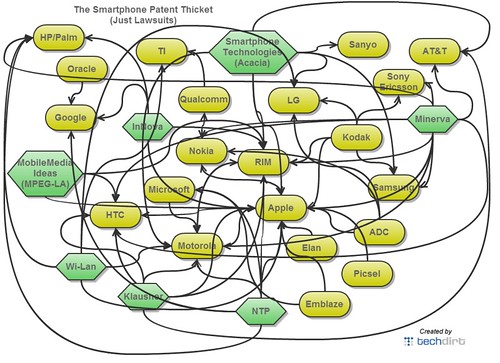Spoiler: Copyrights and Patents ruin Perfect Markets, hassle software companies, bolster the plutocracy, prevent market forces from producing free digital goods and services, and make me Angry at night. Here's why we should get rid of them:
Last time we learned about Pareto Optimality and Perfect Markets and talked about them within the context of healthcare. In discussing the characteristics of perfect markets, I mentioned that one of the primary requirements is low barrier to entry. This is particularly relevant in the context of intellectual property. Intellectual property dramatically (and purposefully) increases barriers to entry, damaging the inherent awesomeness of markets. This is most egregious in the world of digital products (music, literature, software) because the marginal cost (that is the cost of producing an additional copy of the existing good beyond the first) of these items is $0. In a perfect market, items' prices approach their marginal costs. Without IP we'd have a lot of legal free stuff on the internet (instead of a lot of illegal free stuff on the internet).
The idea behind intellectual property is to encourage innovation by giving innovators limited time monopolies... presumably to offset the costs incurred in the process of innovating. This makes some sense for inventing new machines, and a lot of sense for inventing new drugs. Both of them require significant investments in time and money in order to come up with and get into product lines. One might legitimately be able to argue that absent patent protections, drug companies would not invent new drugs. The best business model might be for them to sit around waiting for someone else to make a new drug and then race to produce it en-mass at the lowest costs possible.
On the other hand, I'm not convinced that pharmaceutical companies racing to make cheap drugs would be the end of the world. Especially with a well funded public research community to invent the drugs for prestige using cheap immigrant labor (basically the current state of American Academia). We could fund the extra research out of our dramatically reduced healthcare costs.
There are other businesses where intellectual property protections have basically no impact on innovation. Writers throughout history have shamelessly plagiarized each other -- the idea that this was even vaguely bad is relatively new -- and they still, you know, wrote a lot. Likewise musicians. Artists have things even easier because producing an exact copy of any non-photograph artistic work takes, well, about the same amount of time and energy as the original. Sure, some forgers will make a lot of money using the artist's good name to sell his nearly-indistinguishable-from-the-original forgeries, but the real artist has the advantage of being able to sell his work first hand and the forger will always be behind the curve. I'm just not sold that these things protect innovation. They certainly inflate certain revenue streams, but I don't see any particular reason that society should be invested in having extraordinarily wealthy writers and musicians, except to protect the plutocracy. We should be invested in having high qualities and quantities of writing and music. Have you ever heard any arguments that artists get better once we start paying them copious amounts of money? Me neither.
In the software business this becomes really horrible, as all the damn lawsuits in the mobile phone space right now show. Basically, everyone is suing everyone:
In summary, patents and copyrights don't seem to encourage innovation so much as impose rents on new competitors which is, you know, the opposite thing. It increases prices of goods that should by the logic of markets be free. Why would we do that? Let's stop.

No comments:
Post a Comment